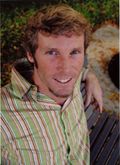28 Sep Telluride environment: forest health
[click “Play” to hear Clint’s interview with Kevin Gurney]
Telluride’s The New Community Coalition, The Telluride Institute and the Wilkinson Public Library joined forces to present a workshop, keynoted by Dr. Kevin Gurney. The subject: “Forest Health and the Community Carbon Connection.” The event takes place Wednesday, September 30, 6 p.m., at the Library.
The context in digestible sound bytes: Marcel Theroux’s new book “Hot Ice,” is a novel about what happens to the world post collapse. (Hint: Civilization is largely reduced to preindustrial levels and cities have gone the way of “The Road.”) If the Arctic is the proverbial canary in the coal mine in terms of global warming, many scientists agree the bird has already chirped its last. Ever since Al Gore and the Intergovernmental Panel on Climate Change shared The Nobel Peace Prize in 2007, climate change and the constellation of horrors surrounding the real possibility – inevitability? – of a total meltdown is the new normal, and carbon dioxide emissions, the new Darth Vader. It will take lots more than good will, driving a Prius, riding a bike, turning down thermostats, replacing light bulbs, and solar panels to reduce greenhouse gas emissions. It will take a village, and then some.
Telluride is being proactive. The mayors of Telluride and the Mountain Village have announced the Mayoral Challenge to have 100 percent of the electricity used in the immediate region provided by renewable energy sources by 2020, and the two towns and San Miguel county have funded The New Community Coalition, a driver and clearinghouse for sustainable initiatives, which is transforming the landscape one Festival and now, one tree at a time.
The good news about trees is that healthy ones are reservoirs of carbon dioxide, and from a watershed perspective, the region’s richly forested landscape could prove to be a major asset. The bad news: when trees die from beetles and buzz saws, they release that carbon back into the atmosphere.
Dr. Gurney is an atmospheric scientist, ecologist, policy expert, and member of the IPCC, currently working in the areas of carbon cycle science, climate science/policy at Purdue University, where he is an Associate Professor in the Earth and Atmospheric Science and Agronomy departments.
Gurney has worked in NGOs, think tanks, consulting, and academia and has focused on topics within global change and climate change. He also has worked extensively on climate policy and has been involved for over a decade with the United Nations Climate Change Framework Convention and the Kyoto Protocol.
To learn more about the relationship between pending national legislation aimed at mitigating human-caused climate change and Telluride’s trees, click the “play” button and listen to his podcast.



Sorry, the comment form is closed at this time.